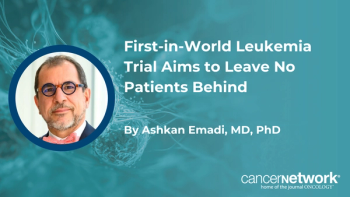
Microbiome Signature Differences May Impact Rectal Cancer Treatment Effect
Gut microbiome signatures may lead the way for more accurate treatments and diagnoses for patients with colorectal cancer.
Gut microbiome signatures that differ based on factors including race may determine the onset of disease and help with treatment options in patients with rectal cancer, according to findings from a study published in the Journal of Immunotherapy and Precision Oncology.
Of the patients enrolled, 47% were White and Hispanic, and the median age was 51 years. When beta diversity metrics were utilized, there was a significant clustering for race and age (P <.001), and for onset of disease (Aitchison P = .022, Bray-Curtis P = .035). Additionally, the most common enrichment of the bacterial family was Prevotellaceae (P = .0007).
“We identified microbiome composition differences by race and ethnicity in a diverse cohort of patients undergoing definitive treatment for rectal cancer. Future studies are warranted to examine potential mechanisms by which gut microbiome composition may affect colorectal cancer [CRC] carcinogenesis and treatment effect,” the study authors wrote.
A total of 64 patients were enrolled, with 52% having a complete or near complete response to therapy. Patients who were White and Hispanic had a higher median body mass index (BMI) than those who were not (29.55 vs 25.4; P = .008).
Investigators did not determine significantly different abundant taxa by CRC age of onset. They did notice a significantly lower Shannon diversity in patients with early-onset CRC (P = .029). When responses occurred, associated variables included T stage (P = .042) and the medical oncology facility (P = .123). Prior to controlling for these variables, there were no significant differences in taxa abundance or beta and alpha diversity for those with a complete, near complete, partial, or poor response.
Patients with broad-spectrum antibiotic use for the Enterococcaceae family were enriched (LinDA fold change = 4.15, MaAsLin2 fold change = 2.79, combined adjusted P = .005). There was no reference group for this antibiotic use.
In the overall group, 59.4% of patients were male, 53.1% had average onset CRC, and the median BMI was 28.0. Most patients were treated and tested at Parkland Health and Hospital System (64.1%), had an initial T stage of 3a-b (48.4%), and an initial N stage of N2 (56.3%). Additionally, short total neoadjuvant therapy was given to most patients in the overall group (46.9%), no antibiotics were given in 71.9%, and 32.8% had a pathological response.
Patients were enrolled if they had newly diagnosed stage II to IV rectal adenocarcinoma and were undergoing definitive treatment; those with limited stage IV disease were required to be treated with curative local therapy and radiation. Patients were excluded if they had upfront abdominal perineal resection or diverting colostomy for obstruction.
Investigators determined response by radiographic grading for those without primary surgery, and the Ryan scheme for tumor regression was used. For patients who did not undergo primary surgery, responses were based on restaging MRI after chemotherapy and radiation. Stool samples were collected prior to radiation, and genomic DNA was extracted. 16s rRNA genes were amplified from each sample.
The study was designed based on the increasing rates of early onset CRC in patients less than 50 years old. Of note, this was associated with rectal tumors and racial and ethnic disparities for presentation and outcome. Currently, there isn’t a specific mechanism that determines this diagnosis for age, with heritable conditions playing a small part in this diagnosis.
“This [trial] could lead the way to therapeutic interventions that improve outcomes, particularly in traditionally understudied and underserved populations,” the authors concluded.
Reference
Hein DM, Coughlin LA, Poulides N, Koh AY, Sanford NN. Assessment of distinct gut microbiome signatures in a diverse cohort of patients undergoing definitive treatment for rectal cancer. J Immunother Precis Oncol. 2024;00(00). doi:10.36401/JIPO-23-30.
Newsletter
Stay up to date on recent advances in the multidisciplinary approach to cancer.












































